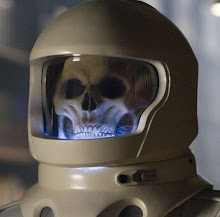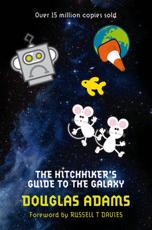 I spent the majority of yesterday finishing off a book I've been reading recently, Rivers of London, and since it's been nearly two months since I reviewed a novel, I decided to do a blog post about it.
I spent the majority of yesterday finishing off a book I've been reading recently, Rivers of London, and since it's been nearly two months since I reviewed a novel, I decided to do a blog post about it.Rivers of London is a textbook example of an urban fantasy novel; the story follows Peter Grant, a probationary constable working with the Metropolitan Police Service, who starts the story (much to his own surprise) by taking a witness statement from a ghost. Soon he is drawn into a wizarding apprenticeship, studying under Chief Inspector Nightingale, and finds himself working in a small, secretive branch of the MPS that deals with the supernatural. Over the course of the novel, he becomes involved in an investigation into a series of brutal, magic-related murders.
The most appealing thing about the novel is it's sheer readability. It's the kind of book that you sit down to read for five minutes and end up reading for three hours. The most obvious reason behind this is the excellent narration - the story is told from a first-person perspective, as we see everything that occurs in the novel through the eyes of our protagonist Peter. Author Ben Aaronovitch has done a brilliant job of making Peter a likable character; he balances the relatable everyman with whom the audience can sympathise, with the witty, intelligent central character the audience can root for. Peter's wry observations and exasperated sense of humour lend the novel a lighter tone, and provide plenty of laughs over the duration of the book. His perspective is unique, original and entertaining, and this makes it easy to devour the book in huge chunks, because even when the story falters a little, the way Aaronovitch tells the story through Peter never fails to keep the reader hooked.
I mentioned just now that the story stumbles at times, and while this is true, it's only a very small issue. Mostly the story flows smoothly and naturally, with the murder investigation progressing in such a way that new information is constantly unveiled, yet the reader remains intrigued throughout. For every plot thread that is wrapped up, a new one is unraveled, and this contributes to the readability I mentioned above; there is always something the reader is left waiting to find out, always something new to be discovered if you carry on reading for just a few more pages. But unfortunately there is one point, early on in the story, which I feel the author mishandled; the moment when Peter is properly introduced to magic. This is the stumbling block of the story. At the beginning of the novel, Peter has no knowledge of magic or the supernatural whatsoever. His only exposure to anything out of the ordinary is his talk with the ghost, right at the book's beginning. He spends the next few days pondering the experience, wondering whether or not the ghost was real. Then, in a scene that lasts roughly two pages, he is introduced to his mentor Nightingale and given a criminally short version of the 'magic is real' speech that is such a common thread in fantasy stories. It isn't so much the brevity of the scene that bothers me, it's more Peter's reaction - or rather, lack of reaction. Peter takes the news that vampires, ghosts and wizards are all real completely in his stride, to the point where he seems almost ridiculously detached from the whole thing. He goes from an ordinary copper to telekinesis, and at no point does he sit down and think 'Wow, I'm a sorcerer now.' It makes him seem emotionless, and that doesn't gel with how he comes across in the rest of the novel.
I've banged on quite a bit about that one scene, so I'll reiterate that it's only a small issue. Once Peter is inducted into his wizard's apprenticeship under Nightingale, the novel adopts a near-flawless flow of tension, mystery and humour, the story slowly and subtly building up to a fantastic climax (coupled with a betrayal from one character I won't spoil), and overall I thought the plot was wonderful. It wraps itself up quite nicely, though several loose strands are left hanging for the sequel, Moon Over Soho (which I have yet to read). It's a great example of a book that stands on it's own but also works as the push-off point for a series. So don't be put off when I say that this one, small part of the book's story was flawed, because ultimately it's quite a superb piece of plotting.
And of course, I couldn't possibly review Rivers of London without talking about the eponymous city itself. It's clear that Aaronovitch is extremely fond of London, and it's also clear that he's hugely knowledgeable about it. Trivia and tidbits of London history seep through the pages of this novel, particularly in relation to Thames river and the various other rivers that flow through, past, or near London - hence the novel's title. In the hands of a less talented writer this could become tedious very quickly, but fortunately in this case all of the slivers of knowledge are delivered through Peter, a Londoner himself. The information is seamlessly slipped into Peter's narrative of the story in a way that feels unforced and in character, so Aaronovitch can show his love for the city all he likes without boring the reader. On the contrary, this added level of detail makes the realistic depiction of the London police service stand out, which in turn emphasises how uncannily odd the various supernatural events are. So by adding in tiny snippets of London trivia, the book manages to do what every urban fantasy novel aspires to do, and stands the juxtaposition of normal and unnatural front and center, obvious and unmissable, in the eyes of the reader.
Bits and Bobs
- Much to my surprise, it turns out Ben Aaronovitch has also written for Doctor Who! After I was finished reading I read the 'about the author' paragraph and apparently he wrote the McCoy story Remembrance of the Daleks, and the later McCoy story Battlefield. As I'm sure you all know, being involved in Doctor Who in any capacity is worth ten billion Alex points, so well done to him.
- My favourite line by far in the novel is located in an early discussion between Peter and Nightingale.
'So magic is real,' I said. 'Which makes you a... what?'
'A wizard.'
'Like Harry Potter?'
Nightingale sighed. 'No,' he said. 'Not like Harry Potter.'
'In what way?'
'I'm not a fictional character,' said Nightingale.
I'll never be quite sure why fictional characters saying 'I'm not a fictional character' amuses me so much, but it does. It really, really does.
In far less interesting me-related news, I broke up for the Christmas holidays on Friday, so I'm free until 2012! This means I have two weeks to engage in all of my favourite hobbies, like sleeping, eating pringles, and staring vacantly into space wondering absently if I should try and get something productive done. Ah, good times. But anyway, I hope you enjoyed this review, and until next time, thanks for reading.










